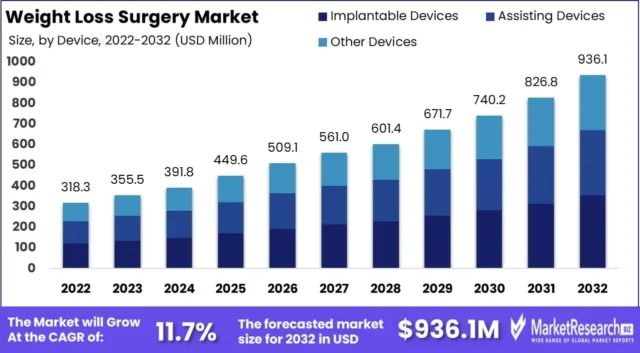The landscape of weight loss surgery is a dynamic field focused on enhancing health and wellness for individuals grappling with obesity. Commonly referred to as bariatric surgery, these procedures are designed to transform the anatomy of the digestive system, effectively curbing food intake, inducing feelings of satiety, and optimizing metabolic functions. Typically recommended for those with severe obesity or related health complications resistant to traditional weight loss methods, such as diet and exercise, weight loss surgery encompasses a range of techniques. From established procedures like gastric bypass, sleeve gastrectomy, and gastric banding to emerging minimally invasive and endoscopic approaches, the market offers diverse options for individuals seeking transformative solutions to their weight management journey.
Driving Forces Behind the Weight Loss Surgery Market
As the global prevalence of obesity continues to rise, fueled by sedentary lifestyles, poor dietary habits, and socioeconomic disparities, the demand for weight loss surgery as a viable treatment option escalates. Individuals grappling with obesity-related health challenges seek sustainable solutions beyond conventional methods, driving the growth of the weight loss surgery market.
The Health Impact of Obesity
Obesity is linked to a multitude of health complications, including type 2 diabetes, cardiovascular diseases, hypertension, sleep apnea, and certain cancers. Weight loss surgery presents an effective strategy for reducing obesity-related comorbidities, enhancing metabolic health, and elevating overall well-being.
Efficacy of Bariatric Surgery
Compared to non-surgical interventions, bariatric surgery has proven to be markedly superior in achieving substantial and enduring weight loss, metabolic enhancements, and mitigation of obesity-related health risks. Favorable outcomes and high patient satisfaction rates contribute to the increasing acceptance and demand for weight loss surgery.
Innovations in Surgical Techniques
Continuous advancements in bariatric surgical techniques, such as minimally invasive procedures, robotic-assisted surgery, and endoscopic approaches, have significantly enhanced safety, efficacy, and postoperative recovery. These innovations broaden the pool of eligible candidates and propel market expansion.
Holistic Care Approaches
Multidisciplinary care models, integrating preoperative assessments, nutritional guidance, psychological support, and long-term follow-up, optimize patient outcomes, mitigate complications, and ensure enduring weight loss success post-surgery. This comprehensive approach enriches the value proposition of weight loss surgery programs.
Increasing Awareness and Acceptance
Growing recognition of weight loss surgery as a legitimate and effective treatment for obesity, coupled with heightened awareness regarding its benefits, risks, and eligibility criteria among healthcare providers, patients, and insurers, drives referrals, patient inquiries, and market growth.
Challenges Restraining Market Growth
Cost and Accessibility
The substantial expenses associated with weight loss surgery, encompassing surgical fees, hospitalization costs, preoperative evaluations, and postoperative care, may present financial obstacles for uninsured or underinsured individuals, hindering access to bariatric procedures within certain demographic segments.
Insurance Coverage and Reimbursement Hurdles
Inconsistent insurance coverage policies, stringent eligibility requirements, and reimbursement limitations for weight loss surgery procedures may impede patient access to bariatric services and dissuade healthcare providers from offering these treatments, impacting market expansion and patient accessibility.
Perceived Risks and Stigma
Misconceptions, apprehensions regarding surgical complications, and societal stigma surrounding weight loss surgery may deter individuals from pursuing surgical interventions for obesity, despite the potential health benefits and improvements in quality of life they offer.


